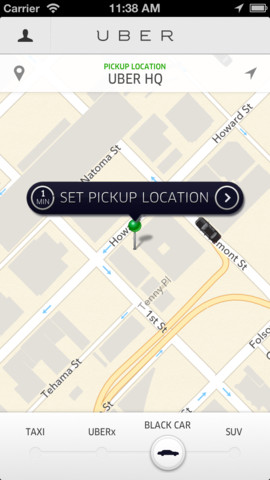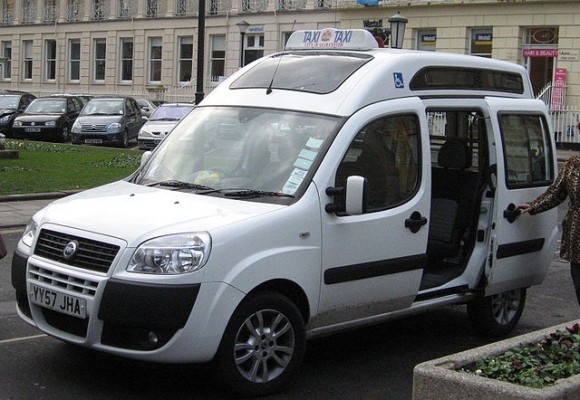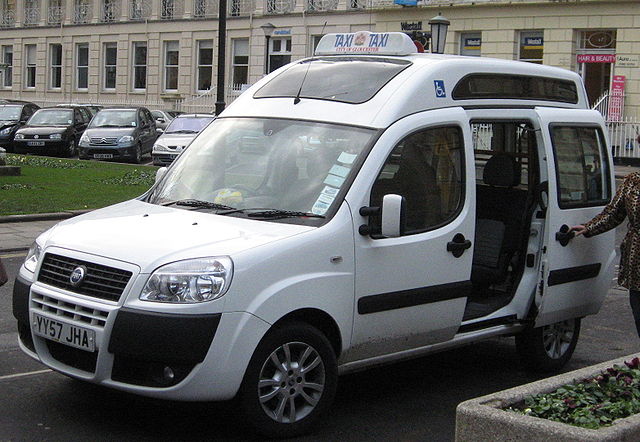aNewDomain.net — Uber customers are raving about the startup taxi service based out of San Francisco. They love the ability to split fares, receive email receipts and get pretty much anywhere with a click on their smartphones. Enter the age of the sharing economy.

Image credit: David Michaelis
On the other hand, the taxi industry is having a collective stroke. Old money and old systems have always manipulated the regulation of taxi licenses, but surprisingly, it is not the corporate owners who feel the disruption. It is the working-class drivers. Their business is being upended.
Usually, a night-shift taxi driver barely makes minimum wage. Meanwhile Uber, while increasing costs, also adds loads of convenience. Uber drivers have more privileges than a typical cabbie, and their model is slowly killing the transportation industry. Or re-inventing it.
Looking ahead, by the year 2020 Uber may employ a fleet of self-driving cars. They can afford it, having been just evaluated at $10 billion. This will, of course, disrupt the entire driving realm of personal (read: human) drivers, whether they work for a traditional model or a new one.
UPDATE-
“Uber will eventually replace the people who drive its cars with cars that drive themselves, CEO Travis Kalanick said today at the Code Conference. A day after Google unveiled the prototype for its own driverless vehicle, Kalanick was visibly excited at the prospect of developing a fleet of driverless vehicles, which he said would make car ownership rare. “The reason Uber could be expensive is because you’re not just paying for the car — you’re paying for the other dude in the car,” Kalanick said. “When there’s no other dude in the car, the cost of taking an Uber anywhere becomes cheaper than owning a vehicle. So the magic there is, you basically bring the cost below the cost of ownership for everybody, and then car ownership goes away.” from the The Verge.
Anti-tech and Uber Abroad
It is not just taxi drivers that are upset. In Seattle a group called The Counterforce, which has protested against tech companies in the past, spent Saturday evening “chasing down Uber cabs and detaining them amidst traffic.” That’s according to the inaugural post written by a Counterforce member on a new blog called Destroy Uber: A Clearing House for the Destruction of Uber. “Hundreds of people witnessed this act of defiance against one of the most disgusting tech companies in existence,” Counterforce wrote of Saturday’s protest.
Uber Technologies Inc. has been banned by a Berlin court from providing taxi services via its smartphone software, in a sign the rebellion by local chauffeurs to the U.S. company’s business model in Europe is growing. The San Francisco-based company said in a statement that the Berlin claimant had so far chosen not to enforce the injunction and that it would continue providing its services until further notice. Uber has faced opposition in France and Belgium as it expands outside the U.S. into Europe and Asia.”
Uber is being challenged in 15 out of 100 cities it is operating in globally.
The Battle for a Sharing Economy
These examples illustrate that regulators and citizens alike are struggling with the concept of a sharing economy. The heated debate centers around a growing number of apps and online services that give consumers more-direct control over their purchasing choices. Are these services cutting-edge conveniences that should be encouraged, or rapidly-expanding businesses that need more regulation?

Image credit: WikiMedia Commons
The immediate effect of the startup is that economy business models disrupt the status quo. The shakeup is also being felt by regulators struggling to shoehorn the new enterprises into regulatory structures that were developed, at best, in the middle of last century.
Protection of old systems against the likes of Airbnb and Uber will not work. Customers will always win against vested interests if the new services better represent what they want and are affordable in this economy.
An Airbnb customer’s voice stands for many:
Airbnb is a business model that gives more power to property owners and in some cases tenants, to avoid the hassles, entitled attitudes, bullying and nightmares that can come with long term tenants, and which challenges government’s expropriation of private property, and provides much needed services to those seeking short term rentals.”
The newcomers’ opponents, which include competitors, officials or worried citizens, complain that companies like Airbnb and Uber dodge the rules and taxes that apply to conventional businesses. Their critics claim that these startups are a danger to an unsuspecting public.
But, in the end, the public will judge.
The sharing economy is here to stay, even if demonstrations continue. Convenience, better prices and a more-connected community are the main reasons for this change. A new economy presumes that it works globally for the benefit of all, if it can address the issue of endangered jobs.
Click for an infographic on this topic: Sharing is the New Buying (How to Win in the Collaborative Economy) from visioncritical.
Based in Australia, David Michaelis is a world-renowned international journalist and founder of Link Tv. At aNewDomain.net, he covers the global beat, focusing on politics and other international topics of note for our readers in a variety of forums. Email him at DavidMc@aNewDomain.net.














Jeremy Rifkin reports that Airbnb’s 416,000 guests from mid-2012 to mid-2013
cost the New York hotel industry 1 million lost room nights.
http://articles.latimes.com/2014/apr/06/opinion/la-oe-rifkin-airbnb-20140406
Today’s Internet-based sharing is reminiscent of the 1960s, but it feels more like pursuit of business opportunities than a social movement.
it is a mix of sharing social and competitive native digital disruption.
Real people are involved in cartels — as in, taxi cartels. http://www.fee.org/the_freeman/detail/taxi-regulation-and-the-failures-of-progressivism
http://www.fee.org/the_freeman/detail/no-vans-land